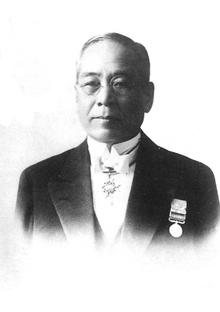Sakichi Toyoda
| Sakichi Toyoda 豊田 佐吉 |
|
|---|---|
 |
|
| Born |
February 14, 1867 Japan |
| Died |
October 30, 1930 (aged 63) Japan |
| Occupation | Founder, Toyota Boshoku Corporation, Toyota Industries, which eventually spawned the Toyota Group |
Sakichi Toyoda (豊田 佐吉 Toyoda Sakichi?, February 14, 1867 – October 30, 1930) was a Japanese inventor and industrialist. He was born in Kosai, Shizuoka. The son of a poor carpenter, Toyoda is referred to as the "King of Japanese Inventors".
Sakichi Toyoda is often referred to as the father of the Japanese industrial revolution. He is also the founder of Toyota Industries Co., Ltd.
He invented numerous weaving devices. His most famous invention was the automatic power loom in which he implemented the principle of Jidoka (autonomous automation). The principle of Jidoka, which means that the machine stops itself when a problem occurs, became later a part of the Toyota Production System.
Toyoda developed the concept of 5 Whys: When a problem occurs, ask "why" five times to try to find the source of the problem, then put into place something to prevent the problem from recurring. This concept is used today as part of applying lean methodologies to solve problems, improve quality, and reduce costs.
The descendants of Sakichi Toyoda who established Toyoda Automatic Loom Works, have long dominated the upper management of Toyota Motors, which was incorporated in 1937. Shoichiro Toyoda was born in Nagoya on February 17, 1925, the son of Kiichiro Toyoda, who would become the president of Toyota between 1941 and 1950; and in due course, Shoichiro Toyoda became president of the company between 1982 and 1992. His 52-year-old son, Akio Toyoda, was the chief contender for the office of president when Katsuaki Watanabe relinquished that post to become Chairman; and the expectation was confirmed in 2009.
...
Wikipedia
